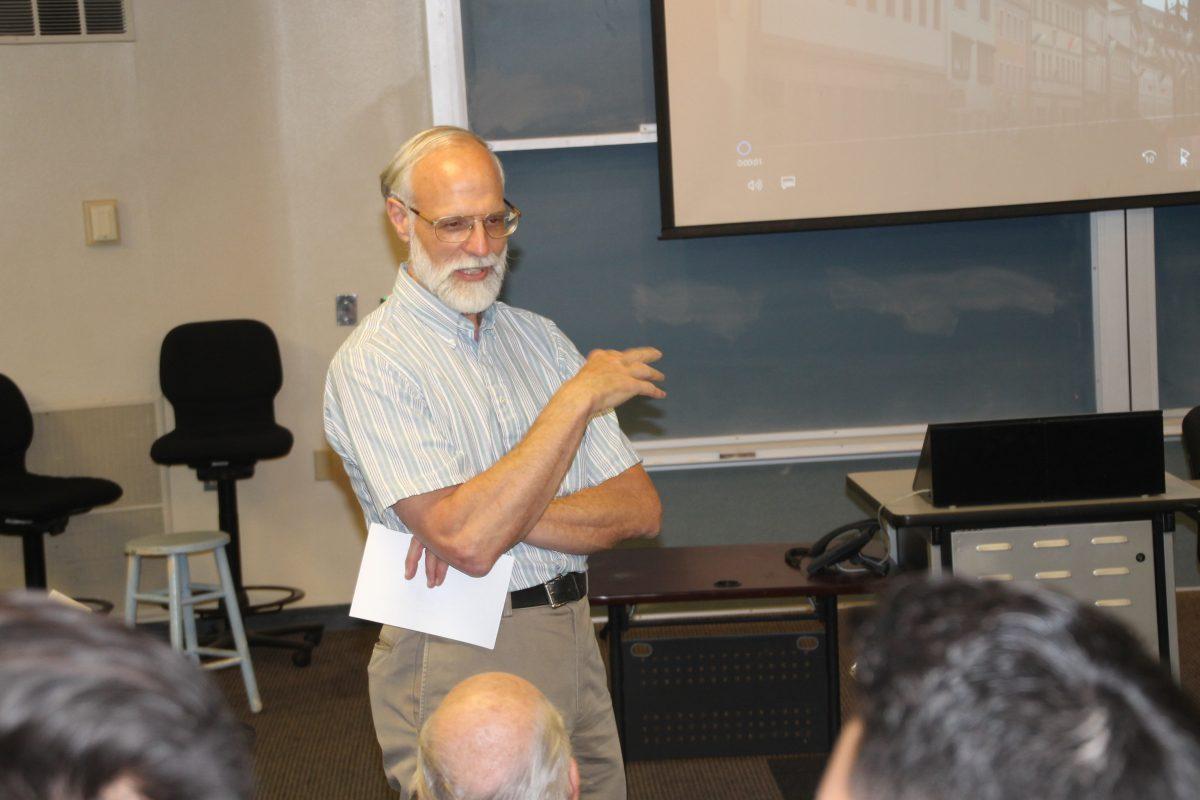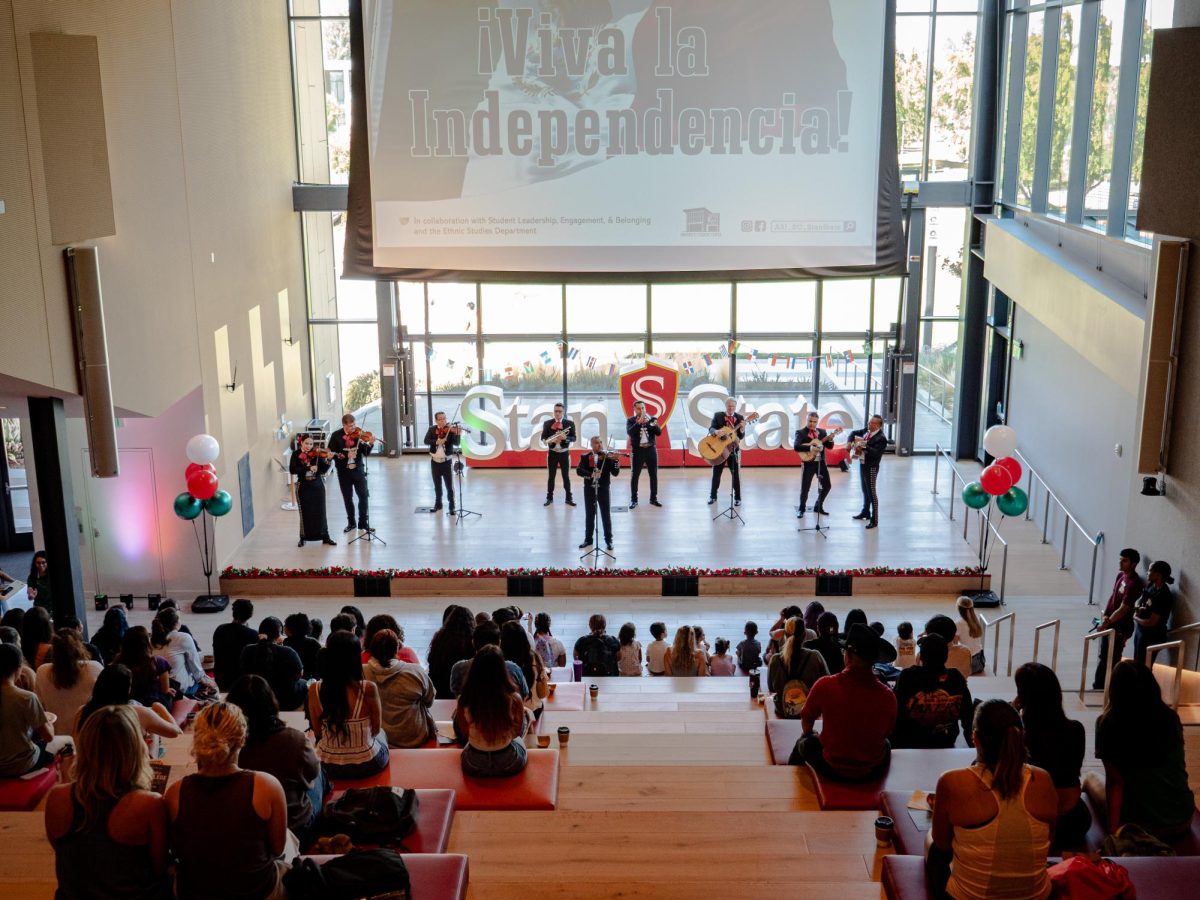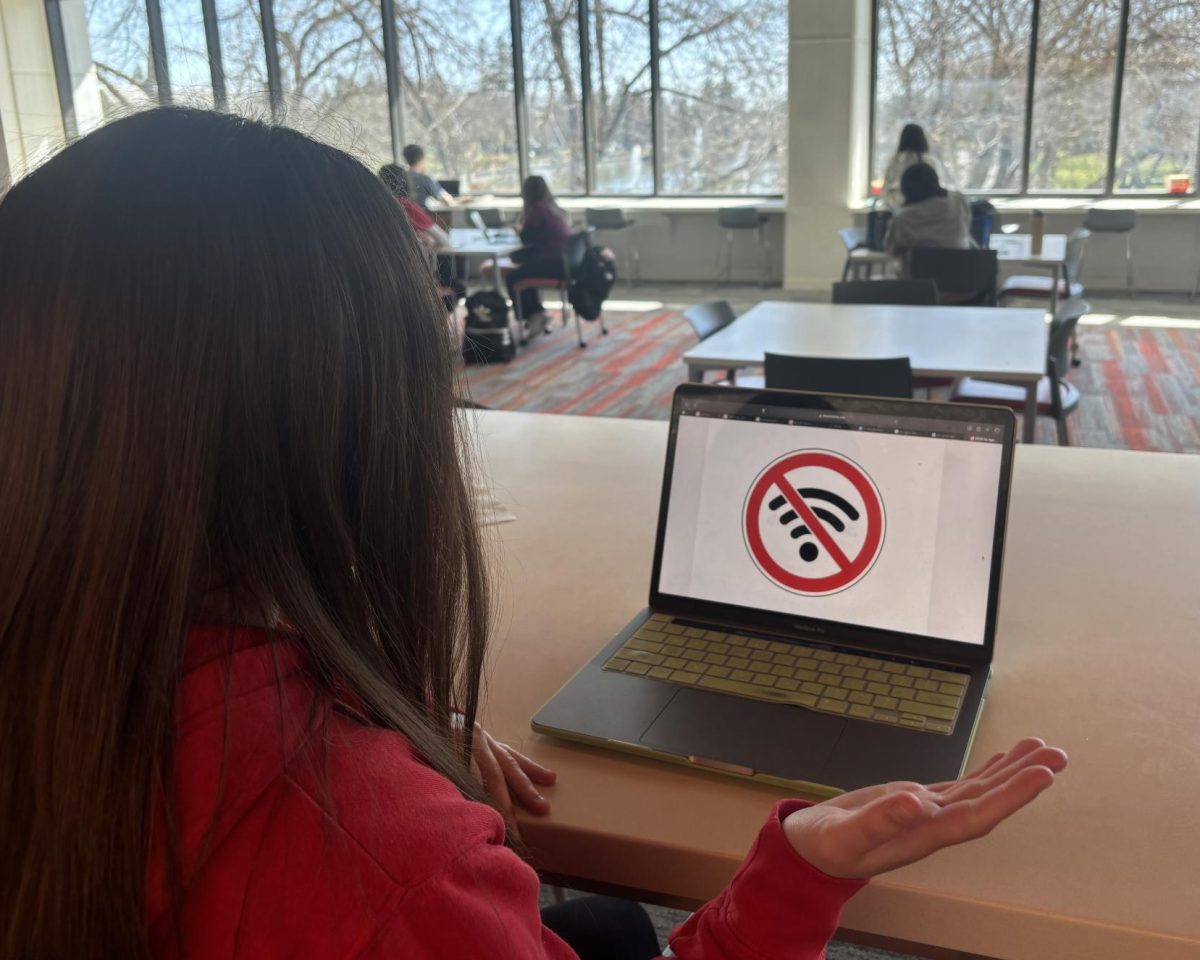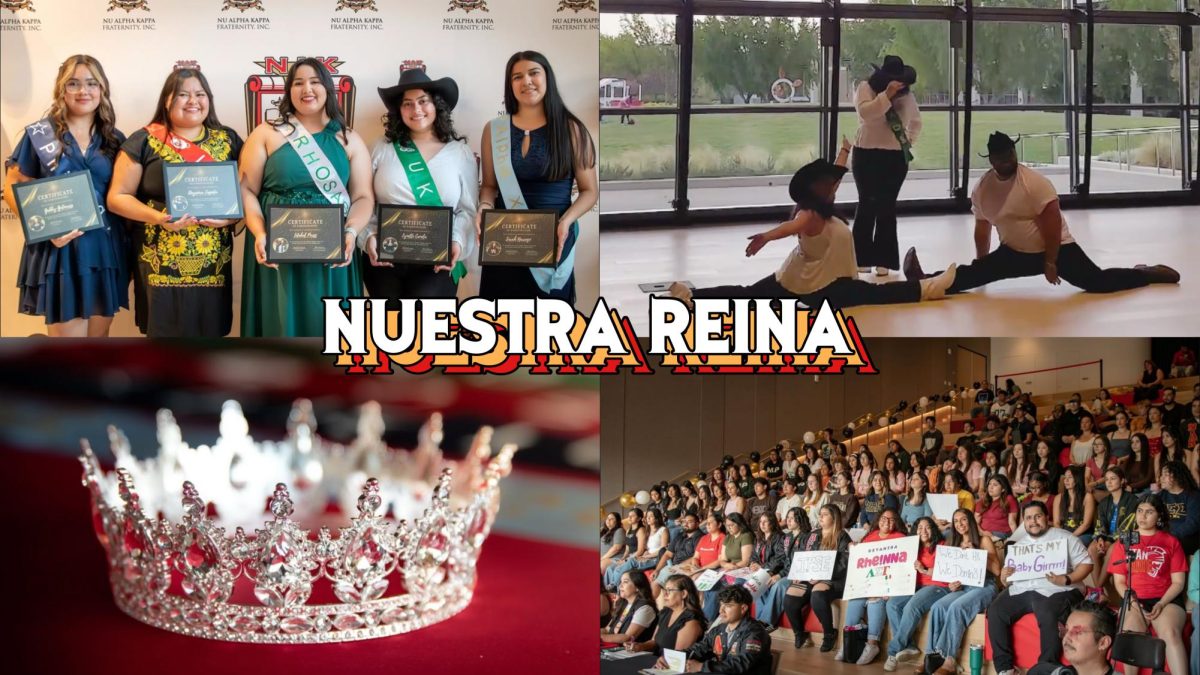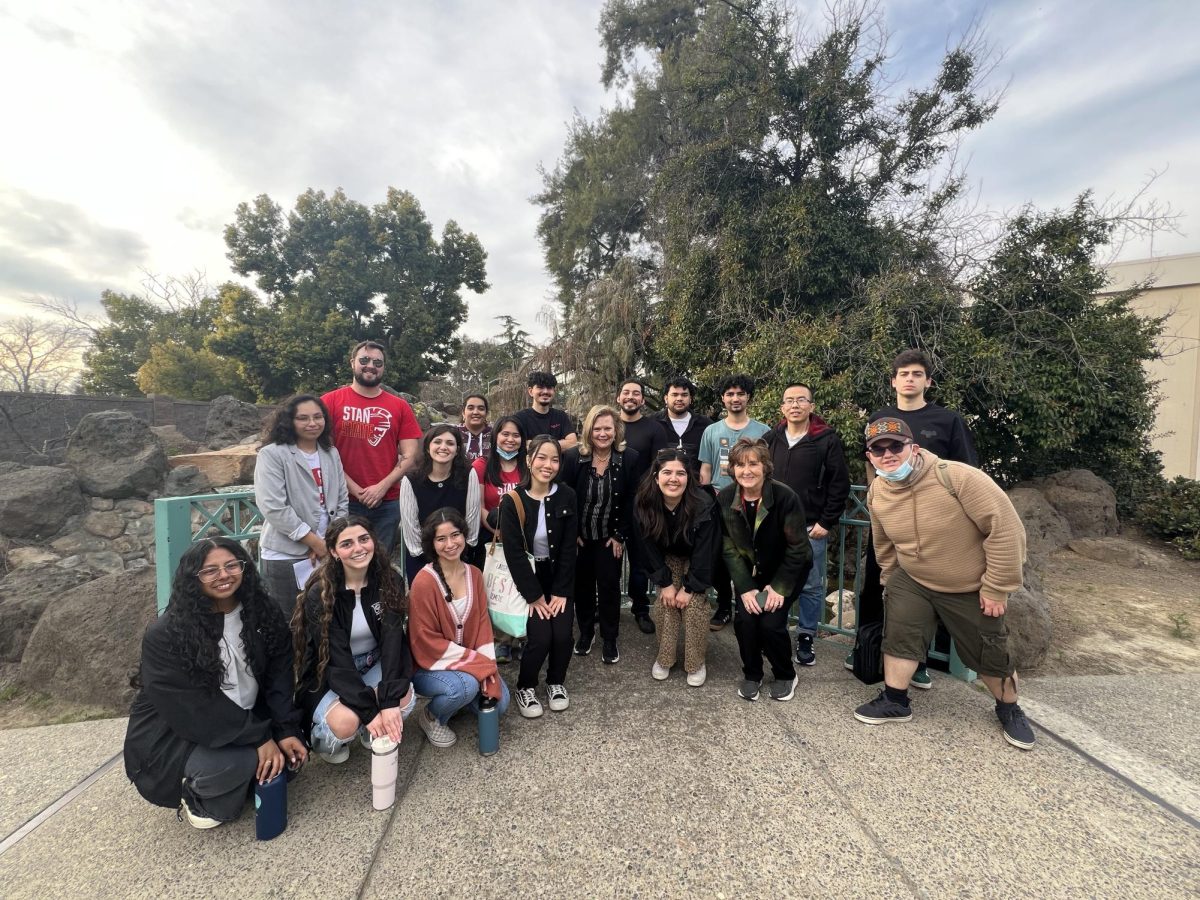Today marks 500 years after the German Reformation. To commemorate this event, history professors Richard Weikart, Bret Carroll and Jim Cook hosted a night last Friday to show the documentary “Exploring the Reformation and Revivals in Germany” and held an open panel discussion in Bizzini Hall room 102 from 7 p.m. to 8:45 p.m..
The documentary, put together by Weikart and Emmy-Award winning cinematographer and producer Jim Gromer, takes the viewer through Germany and some parts of Switzerland to tell the story of Martin Luther’s religious movement.
Professor Richard Weikart greeting audience members before introducing his documentary. (Signal Photo/Kristen Dias)
“It was a learning experience. Over the course of the last couple of decades, as I’ve been doing research in Germany different times, I’ve visited a lot of these areas,” Weikart said. “It was fun to do the documentary in these places, and especially the last segment for the Awakening Movement because that was one place I hadn’t been to some of those areas before.”
The documentary describes Martin Luther’s ideological viewpoint of obtaining salvation by faith among other ideas which differed from the Catholicism at the time. The Reformation, the Pietist movement and Awakening Movement were the three historical revivals focused during the roughly 26-minute film.
The idea of creating a documentary first came to Weikart’s mind when he was discussing with a friend his desires to visit the various sites of Germany with his family.
“As I was telling him that I wanted to take my family over there to see the sites of the Reformation during 2017, he turned to a lady next to him and said ‘Wouldn’t you want to do that, too,’ and she said, ‘I’ll just watch the movie when it comes out,’ so that gave me the idea,” Weikart said.
From there he came in contact with yet another friend whose son-in-law was the “Emmy-Award winning producer and videographer” Jim Gromer, Weikart said.
Weikart stated that the documentary took them roughly four weeks to put together during the summer.
There to attend the event was Seth Mahaffey, a student interested in history from Modesto Junior College (MJC), who will be transferring to California State University, Stanislaus (Stan State), as a senior in this coming spring.
Seth Mahaffey, MJC student of history, preparing to watch the “Exploring the Reformation and Revivals in Germany”documentary. (Signal Photo/Kristen Dias)
“My teacher at MJC said that this was an interesting piece to go see because it really has shaped history since the 1500s, it made a big difference. I’ve already taken a course regarding the Reformation, it just seemed really interesting to go see,” Mahaffey said.
Prior to viewing the documentary and participating in the open panel discussion, Mahaffey stated that he was looking forward to learning new information in an unbiased and fact-based way regarding the Reformation.
Professor Bret Carroll introducing his lecture: “From Martin Luther to the American Revolution in Three (Easy?) Steps.” (Signal Photo/Kristen Dias)
Also attending the event that evening was Adam Hanson, a construction worker from the local area. He became aware of the event through a friend who knew he would be interested in watching the documentary.
“I really enjoyed it; I actually lived in Germany for two years in that exact same area. I’m Luther’s thirteenth great grandson, direct descendant,” Hanson said. “You don’t really get a sense of how big and how central [churches are] to the community. I mean the churches were at the center of the town and the cities were built around them.”
Hanson added that he was unaware of the amount of established missions and desire for people to want to help others in such a way during the time of the Reformation until viewing the documentary.
Following the conclusion of the film, Professor Cook and Professor Carroll gave lectures on a few other key figures, they felt, who had also influenced history with various religious ideologies that deviated from Catholicism.
Professor Jim Cook gives his lecture on the “Free Spirits of the Reformation.” (Signal Photo/Kristen Dias)
However, Cook’s lecture focused on the “Free Spirits of the Reformation,” which he felt have had a “tremendous influence on the development of American Christianity in the modern world,” whereas Carroll focused more on connecting Martin Luther to the American Revolution in “three (easy?) steps,” Carroll’s PowerPoint read.
Professors Carroll (Left), Weikart (Middle) and Cook (Right) begin answering questions during the open panel discussion following the film. (Signal Photo/Kristen Dias)
During the open panel discussion, a few questions included how missions in Berlin were similar to missions in California, which historical figure had the most impact on individuals during the time of the Reformation and if “Antisemitism” was a factor during this time.
The event evoked the occasional laugh from audience members throughout the night. For example, the final question asked the panel to “construct a parallel universe where the Puritans were Lutherans,” according to Carroll.
Kyle Ramos (freshman, Social Science), (Left), and Joseph Nower (freshman from MJC), (Right), preparing to view the documentary. (Signal Photo/Kristen Dias)
“I thought we had a really nice turn out, and I think, in addition to the film, we had two speakers bring other elements and other angles on the Reformation that I hope benefitted the audience,” Weikart said. “I thought the questions were great and that they showed a lot of interest in the topic.”
Weikart added that creating the documentary was a “learning experience” for him in that he had no former training in matching narration with visual representation in order to create the film.
Professor Richard Weikart and the audience at the Friday night showing of documentary “Exploring the Reformation and Revivals in Germany.” (Signal Photo/Kristen Dias)
“I don’t know if I want to do it again, but it was fun,” Weikart expressed.
To watch the full “Exploring the Reformation and Revivals in Germany” documentary, follow this link.

